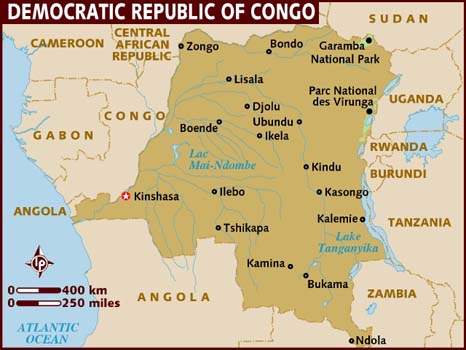 Straddling the equator, the Democratic Republic of the Congo, formerly Zaire and before that the Belgian Congo, is the second largest country in Africa, with land area nearly one quarter that of Canada. Its population is 74 million and the capital city Kinshasa has over 8 million inhabitants.
Straddling the equator, the Democratic Republic of the Congo, formerly Zaire and before that the Belgian Congo, is the second largest country in Africa, with land area nearly one quarter that of Canada. Its population is 74 million and the capital city Kinshasa has over 8 million inhabitants.
The population is one of the youngest in the world, with half of the population being under 18 (in Canada half the population is under 41.) There are over 200 ethnic groups in the country, with the majority being in the Bantu group. The main languages are French, Lingala, Kingwana / Swahili, Kikongo, and Tshiluba. The population’s religious makeup is 70% Christian, 10% Muslim, 20% other.
About 70% of the population lives below the poverty line, despite the fact that the country has vast natural timber, mineral and energy resources and great economic potential. Inflation is well above 10%, and the commercial prime interest rate is a staggering 44%!
Politically and socially, the country has gone through a turbulent evolution during the 51 years since gaining independence from Belgium.
In 1965 Mobutu Sese Seko seized power, retaining it for 32 years through several flawed elections and brutal force. Ethnic strife and civil war touched off by a massive inflow of refugees in 1994 from fighting in Rwanda and Burundi, led to the toppling of Mobutu in May 1997 by a rebellion backed by Rwanda and Uganda.
In August 1998 there was a second insurrection again backed by Rwanda and Uganda. At that time troops from Angola, Chad, Namibia, Sudan, and Zimbabwe intervened to support the existing regime.
A cease-fire was signed in July 1999 but sporadic fighting continued, during which the president Laurent Kabila was assassinated; his son, Joseph Kabila, was named head of state. In 2002, the new president negotiated the withdrawal of Rwandan forces occupying eastern Congo; a later Accord was signed by all remaining warring parties, ending the fighting and establishing a government of national unity. A transitional government was set up in July 2003 and elections took place in 2006. In the recent 2011 national elections, disputed results allowed Joseph Kabila to be re-elected to the presidency.
Systemic corruption since independence and the conflicts that began in May 1997 greatly reduced national output and government revenue, increased external debt, and resulted in the deaths of more than 5 million people from violence, famine, and disease.
Compiled and written by Ian MacDonald

